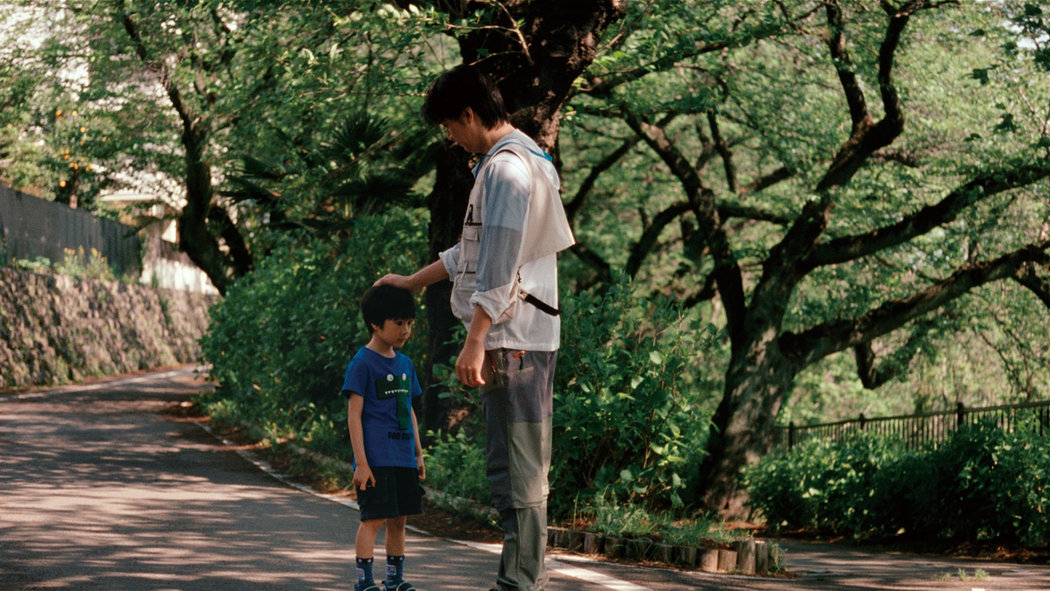By Chlotrudis Independent Film Society
Rating: 5 cats
Director: Hirokazu Kore-eda
Starring: Keita Ninomiya | Machiko Ono | Masaharu Fukuyama | Riri Furanki Kirin Kiki | Shogen Hwang | Yoko Maki

Original language title: Soshite Chici ni Naru
Country: japan
Year: 2014
Running time: 121
IMDB: http://www.imdb.com/title/tt2738050/combined
Jason says: “Those who have been following Hirokazu Kore-eda’s career for roughly the last decade may find it a little surprising that the two six-year-old boys at the center of LIKE FATHER LIKE SON (SOSHITE CHICI NI NARU in the original Japanese) are not necessarily the lens through which they see the entire film. We shouldn’t be surprised; although he has made a few notable films that take a child’s point of view, that’s not all he does, and this film benefits immensely from his being able to move between children’s and adults’ perspectives.
“It starts with Keita Nonomiya (Keita Ninomiya) and his parents Ryota (Masaharu Fukuyama) and Midori (Machiko Ono) interviewing for a private elementary school; it’s intimidating, but Keita impresses just like they taught him in cram school, even if the six-year-old isn’t the workaholic his father is. While waiting for a response, the Nonomiyas are stunned by another call they receive about their son – that he was switched at birth with Ryusei (Shogen Hwang), the son of Yudai (Riri Furanki) and Yukari Saiki (Yoko Maki), something not-unheard of in Japanese maternity wards until the 1970s but now very uncommon. The two families meet so that the boys can start to get acquainted with their birth parents in anticipation of being ‘exchanged’ – something, the hospital administrators say, happens in nearly all such cases.
“There’s a great sequence after the Nonomiyas learn that Keita may not be their biological child but before it’s confirmed where Kore-eda gives us a montage of the parents playing with him, even though Ryota is otherwise rather office-bound. Though the scenes are wordless, it’s immediately clear that Ryota and Midori are trying to get as much time in while Keita is still their son, hinting that parenthood is a state of mind even if they don’t consciously realize as much yet. Like so much of the movie, it is filled with the simple delights of young kids while also being full to bursting with uncertainty, both over what will happen next and just what the characters think that they should feel.
“Inevitably, Ryota is the character who winds up getting a lot of the focus during sequences like that, in part because he often sticks out for how he seems to react to his uncertainty differently. Midori, Yudai, and Yukari seem to expand their hearts and empathize with each other and grow fond of the new little boy that has been added to their lives; the kids are confused but adaptable and resilient. Ryota is just not flexible; he seeks simple definitions and solutions in a messy situation. His proposed solution to the problem – adopting both boys because he and Midori can practically best afford to do so, reeks of arrogance, ambition, and lack of empathy, and there’s something oddly fascinating about how he simply does not know how to connect.
“Masahara Fukuyama does great work with the character; as harsh as he starts out, there’s little real meanness to him, and there’s a real beauty to how his performance transforms as the audience learns what makes this guy tick while he unlocks his own humanity. Machiko Ono plays Midori as a counter to Ryota, the emotional turmoil never far from her surface even as she’s often anchoring the film. Riri Furanki (credited as ‘Lily Franky’), on the other hand, radiates a calming warmth as Yudai; he seems to instinctively realize that time with the kids is precious and that they need stability, and Riri makes this sort of laid-back wisdom funny; the one moment he gets angry makes the emotion seem like an alien invader. Yoko Maki’s Yukari reflects both him and Midori – the immediate bond between Midori and Yukari is one of the movie’s many pleasures, which include a number of fine turns in supporting roles (I loved Kirin Kiki as Midori’s mother and Jun Kumimura as Ryota’s boss). Keita Ninomiya is perfectly natural as his namesake, a kid who often seems both an impressionable blank slate and a very distinct personality.
“The cast member not listed there, Shogen Hwang, initially seems to be getting left out as the story mostly follows the Nonomiyas, but in the latter portion of the film, it becomes clear that Kore-eda is doing this with purpose – for all we’ve seen him, and looked at the dynamics of this whole complicated situation, we still need to really feel the characters getting to know each other toward the end, and that the audience has the chance to discover Ryusei means that Kore-eda can unleash a whole flood of new emotions on the audience. It’s kind of amazing, truthfully, how all the simple sequences Kore-eda had presented up until then jumbles enough in those scenes to lead the audience to the sort of emotional conflict the characters are feeling, even though many likely came in with very strong opinions on what the right thing to do in this situation may be.
“Kore-eda does all this with a story that sometimes barely seems there even as it is methodically moving forward, eliciting intricate and sometimes contradictory emotions despite every scene in the film being quite straightforward in and of itself. He’s a master of this sort of film, and LIKE FATHER LIKE SON is one of the best examples of how. 5 cats
“Seen 18 February 2014 in Landmark Kendalll Square #4 (first-run, DCP)”
